
This article is more than
6 year oldLONDON – His hosts claim his indoor soccer games destroyed embassy equipment. And that he liked to ride a skateboard in the halls. Nearly a year after British police officers dragged him – heavily bearded, disheveled and resisting – into a waiting van, the cramped quarters where he spent seven years avoiding the long reach of the U.S. Justice Department still retain the odor of cat litter from his trusted feline companion.
A court hearing that began here Feb. 24 could determine whether WikiLeaks founder Julian Assange, who published classified U.S. government communications as well as emails hacked by Russia from Hilary Clinton’s failed 2016 presidential campaign, will continue to be confined – and if so, where and how.
The hearing will decide whether Assange is sent to the U.S. to face trial in a case that could have serious implications for First Amendment protections. Yet the core issues at stake – media freedoms in the digital age and the global limits of the U.S. justice system – have been obscured by Assange's personal life, by the refuge he sought in Ecuador's London embassy and by curious claims about his behavior not that well supported.
Since May, the Australian national, 48, has been locked up at Belmarsh Prison, a facility that houses some of Britain's most dangerous lawbreakers.
Assange is there because he was found guilty of skipping bail in 2012; he fled to Ecuador's embassy rather than turn himself in to British authorities for possible extradition to Sweden. At the time, investigators in the Scandinavian country wanted to question him over sexual assault allegations connected to two women.
Assange hid from British police in Ecuador's poky red-brick embassy building, just yards from the famous luxury Harrods department store, because he feared Sweden would, in turn, extradite him to the U.S. The Department of Justice has indicted him on 18 counts, alleging 17 forms of espionage and 1 instance of computer misuse crimes connected to WikiLeaks' dissemination of caches of secret U.S. military documents provided to him by former U.S. Army intelligence analyst Chelsea Manning.
Assange denies all the allegations. The Swedish case has since been dropped. In Britain, he was sentenced to 50 weeks in prison for jumping bail, a period he has already served. He has been denied bail for his extradition hearing because he is considered a flight risk.
But there's more at stake than one anti-secrecy advocate's freedom.
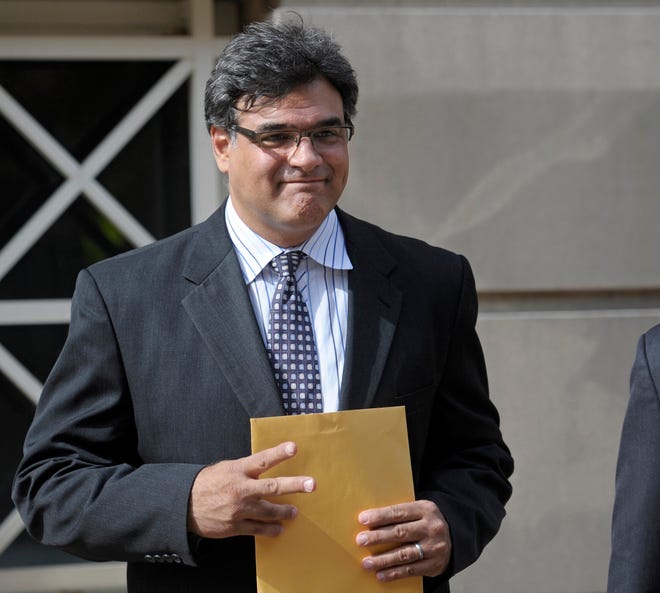
John Kiriakou, a former CIA analyst who blew the whistle on a U.S. government-sanctioned torture program in 2007 that was approved by President George W. Bush because of the feared threats posed by the al-Qaeda terrorist organization, said that Assange's U.S. case could set a precedent that would erode press freedoms for news organizations that publish classified information.
"If you are able to prosecute someone who has a strong case to be called a publisher, then who's next?" said Kiriakou, who served jail time after pleading guilty to leaking the name of an officer involved in waterboarding.
Assange describes himself as a political refugee.
He maintains that as a journalist he should be immune from prosecution and that his work revealed embarrassing and highly damaging facts about the wars in Iraq and Afghanistan and the detainees held at the U.S. base at Guantanamo Bay, Cuba.
Assange's detractors say he doesn't write stories or interview anyone or provide sufficient explanatory context and that the dissemination of raw, unfiltered documents and data – the publication of stolen classified materials – should not count as journalism.
"WikiLeaks walks like a hostile intelligence service and talks like a hostile intelligence service," then-CIA Director Mike Pompeo, now the U.S. secretary of State, said in April 2017, in his first public speech as head of the spy agency. "Assange and his ilk," Pompeo said, seek "personal self-aggrandizement through the destruction of Western values."
In fact, Department of Justice officials in President Barack Obama's administration ultimately decided they could not prosecute Assange for revealing national security secrets, described as one of the largest compromises of classified information in U.S. history, because it risked criminalizing subsequent national security journalism.
"During the Obama administration it was called 'the New York Times problem,' " after the newspaper's distinguished record of publishing information on national security matters the U.S. government has deemed secret, said Stephen Rohde, a historian and constitutional law expert, and a past chair of the Southern California branch of the American Civil Liberties Union. "In other words, how can we indict him for espionage when we're confident he's a journalist, a publisher and enjoys First Amendment rights."
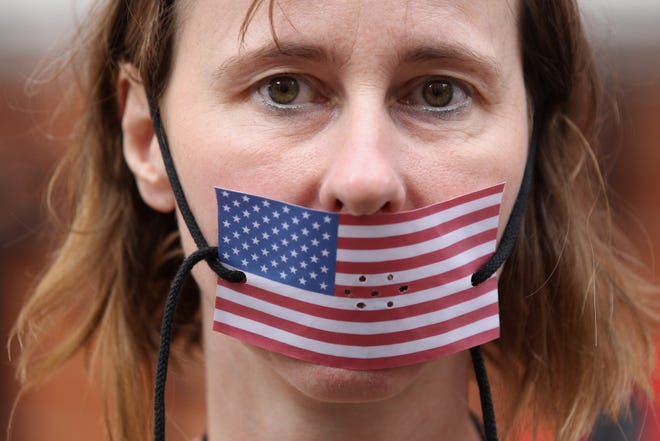
Generally speaking, the First Amendment, as it applies to the press, restrains the government from jailing, fining or imposing liability for what the press publishes.
It does not shield journalists from criminal liability.
On the opening day of Assange's extradition hearing, James Lewis, a British lawyer representing the U.S. government, said Assange was guilty of "straightforward" criminality for hacking and then publishing secret military and intelligence information that put secret U.S. sources at risk of torture or death in places from Iraq to China.
The information Assange published contained about 90,000 Afghanistan War-related "significant activity" reports, 400,000 Iraq War-related reports, 800 Guantanamo Bay "detainee assessment" briefs and 250,000 U.S. State Department cables.
If nothing else, this material illuminated in shocking detail U.S. military and diplomatic procedure and actions in far-flung places, and the light it shined was not flattering.
WikiLeaks' Julian Assange:Journalist or criminal hacker?
To his supporters, Assange is a champion of free speech and the public interest whose exceptional computer skills helped him reveal, among other things, video footage allegedly showing U.S. air crews in Apache helicopters killing a dozen civilians in Iraq.
The dead included two Iraqis working for the Reuters news agency.
"Assange published evidence of war crimes by the U.S. government," said Andrew Wilkie, a left-leaning Australian politician who traveled to Britain in February with fellow Australian lawmaker George Christensen in a show of bipartisan support for Assange. Christensen represents Australia's right-of-center Liberal National Party.
"I'm a big fan of the Trump administration but I'm a bigger fan of free speech," said Christensen.
"Assange did the right thing," added Wilkie. "He served the public interest."
Still, the U.S. government alleges that Assange is a criminal who conspired with Manning to steal thousands of pages of national defense information that has risked the lives of U.S. forces, allies and collaborators from translators to political dissidents with whom it partners to fight repressive regimes.
"No responsible actor – journalist or otherwise – would purposely publish the names of individuals he or she knew to be confidential human sources in war zones, exposing them to the gravest of dangers," U.S. Assistant Attorney General for National Security John C. Demers said when the indictment was announced in May 2019.

Manning served seven years in prison, including pre-trial custody, before Obama commuted her 35-year prison sentence. She is now back in jail for refusing to testify before a grand jury investigating WikiLeaks. Manning, who was convicted of theft and espionage, says she acted on principle when she handed over the top-secret information to WikiLeaks.
If Assange is sent to the U.S. to stand trial, he could get a life sentence – 175 years – if a federal court finds him guilty on all 18 charges and the maximum penalty is imposed.
A Department of Justice spokesperson declined to comment on whether there is any evidence that the WikiLeaks disclosures have directly led to injuries or deaths.
To date, no evidence of deaths or injuries precipitated by WikiLeaks' disclosures has emerged and Lewis, the lawyer representing the U.S. government in Assange's extradition hearing, said that while Washington believes that many of its informants who were outed by WikiLeaks later "disappeared" it can't yet prove the assertion.
Julian Assange:WikiLeaks founder claims ‘spying’ in fight over extradition
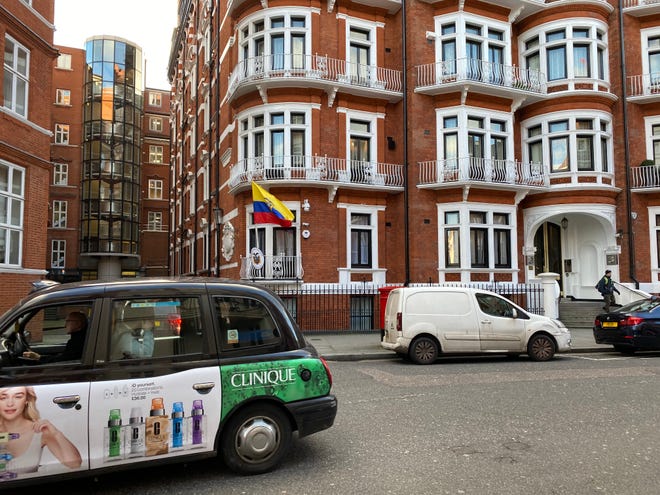
Ecuador insists it kicked Assange out of its embassy after he became an intolerable nuisance at its building in one of London's most upmarket neighborhoods.
While living there, Assange occupied about a third of the embassy's rooms with his cat. He brought in a sun lamp, treadmill, stacks of books, computer equipment and insisted on his own fridge. He also regularly hosted well-known guests such as the musician Lady Gaga and the actor Pamela Anderson. He addressed admirers and gave news conferences from the embassy's tiny balcony – often, as unsuspecting tourists passed by and expensive cars belonging to Harrods' wealthy patrons idled across the street. Due to space constraints, embassy staff had to share a conference room with Assange. One senior diplomat even shared an office with him.
Most people have suffered through a houseguest from hell.
Over time, Ecuador says, that's exactly what Assange became, even allegedly going to the unhygienic length of smearing his own excrement on a bathroom wall. The allegations were first made public in an interview in April 2019 with Ecuador's President Lenin Moreno, who also accused Assange of not looking after his cat and attacking the embassy's security staff. No evidence was released to back up the allegations.
Assange's supporters and legal team strongly deny the claims, which have not been verified. Ecuadorean officials told USA TODAY that some evidence of Assange's misbehavior in the embassy can be found online, such as a YouTube video that shows him standing on a skateboard. Ecuador says it has not released additional evidence because of possible legal retribution from Assange.
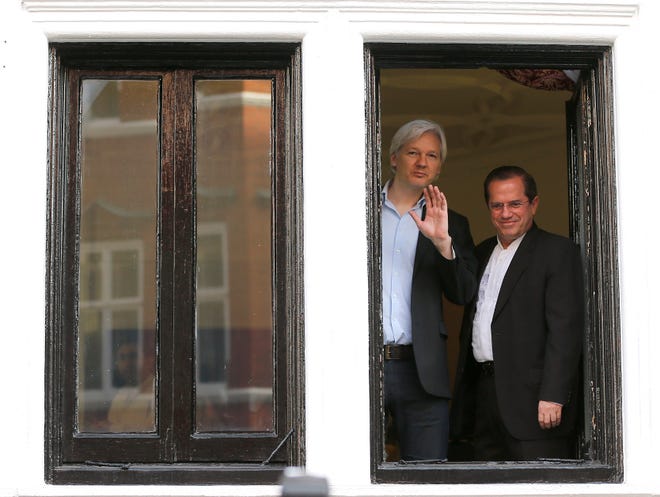
The situation is complicated by the fact that Ecuador started to reexamine its relationship with Assange around the time Moreno took office in 2017. Moreno sought to improve relations with its largest trading partner: the U.S.
In fact, shortly after Assange was expelled from the embassy, President Donald Trump's administration said it was opening a "new chapter of cooperation" with the South American nation that included economic development and natural disasters help.
And, cosmetically at least, Assange's expulsion from the Ecuadorean embassy does appear to mark a sea change in U.S.-Ecuador relations that was foreshadowed on Oct. 16, 2018, when the U.S. House of Representatives Committee on Foreign Affairs wrote a letter to Moreno offering to "advance crucial matters" and "warmer relations" with Washington if Ecuador "handed over Assange to the proper authorities."
In February, Moreno became the first chief of state from Ecuador to visit an American president in 17 years. Moreno's predecessor, Rafael Correa, who granted Assange asylum and even Ecuadorean citizenship before it was revoked by Moreno, embraced Iran, closed a U.S. military base, expelled the U.S.'s ambassador and generally railed against what he described as belligerent American imperialism and capitalism.
Vegan meal:Pamela Anderson’s present for Julian Assange
When USA TODAY visited Ecuador's London embassy in mid-February, some modest refurbishments and redecorations were underway. Officials pointed to the bathroom where they allege Assange spread feces on the wall and also showed off the hotel-style kitchenette where he prepared his meals. But citing legal action in Ecuador and Spain on Assange's behalf, over claims that a security company was contracted by Ecuador's government to spy on Assange while he lived in the embassy, these officials would not reveal further details about what led to Assange's departure. Assange has also tried to sue Ecuador's government for "violating his fundamental rights," by claiming it limited his contact with the outside world while he was holed up there.
Ecuador disputes all the allegations and insists it has done nothing wrong.
British press reported that his cat, who went by various names including "Embassy Cat," "Meowchael Moore," after the American documentary filmmaker, and "James," was given to a shelter when Assange was forced out of the embassy by British police.
The YouTube video footage Ecuador cited as evidence for Assange's poor houseguest manners was uploaded to the video-sharing platform in April 2019. It shows a pale and barefooted Assange attempting to stand on a skateboard in a room in the embassy.
He repeatedly stumbles.
Assange has been indicted in the U.S. under the Espionage Act of 1917.
According to Rohde, the historian and law expert, before Obama took office the 102-year-old act was used just four times against government officials for providing classified information to the media. The Obama administration used it eight times, including against Manning and Edward Snowden, a National Security Agency contractor who leaked information about U.S. telecoms surveillance programs to the press.
Snowden is currently receiving asylum in Russia.
Trump has prosecuted eight government employees for leaking information to the media, according to U.S. Press Freedom Tracker, a press freedom advocacy organization. His administration's use of the act against Assange breaks new legal ground because it is the first time it's been deployed to target a media organization as opposed to a government whistleblower.
Yet while the First Amendment protects the publication of truthful information, it does so only if this information is acquired legally.
The Department of Justice alleges that Assange explicitly solicited – encouraged – Manning to break the law by helping her crack a password that gave her higher-level access to classified computer networks.
Manning disputes the allegation.
As does WikiLeaks.
The Department of Justice's prosecutors are expected to reveal "forensic" digital evidence for this allegation when evidence in Assange's extradition hearing is heard in May. Assange's defense team says it, too, has evidence that refutes the allegation.
According to a report in the Associated Press from April 2019 the genesis of the Trump administration's dialing up of the rhetoric on Assange can be traced to WikiLeaks' release, in 2017, of thousands of pages of documents revealing details about CIA cyber-espionage tools for breaking into targeted computers, cellphones and consumer electronics. However, there is an alternative explanation for Trump's interest in a case that Rohde said that if successfully prosecuted would have a "chilling effect" on First Amendment protections for the press: Trump's disdain for the media.
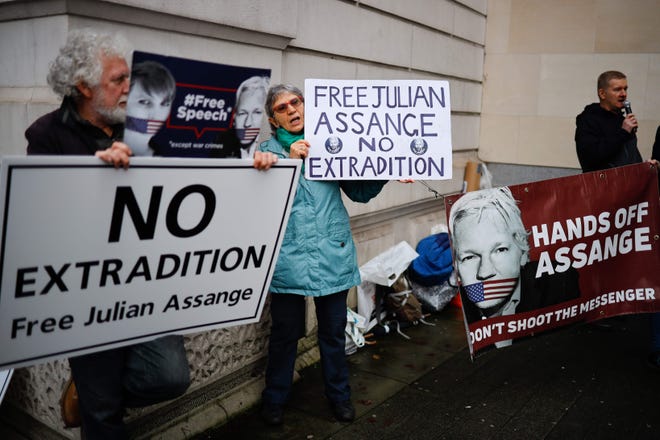
"Assange is low-hanging fruit to Trump," said Rohde. "They can go through the whole process, and win or lose, the process will keep the ball in the air and reinforce that he's prosecuting leakers and the media."
Carl Tobias, a law professor at the University of Richmond, agreed with this assessment.
Trump "probably believes he can profit politically from pursuing Assange," he said.
While the U.S. indictment against Assange does not relate to WikiLeaks' 2016 publication of hacked emails belonging to Clinton's presidential campaign, at a preliminary hearing for Assange's extradition case in late February, Edward Fitzgerald, one of his lawyers, nevertheless said there is evidence that Trump, viathen-Republican Rep. Dana Rohrabacher, offered him a pardon if he agreed to say Russia was not involved in leaking the emails. The White House and Rohrabacher deny a pardon was offered.
As the extradition hearing got underway, Fitzgerald told a British judge the U.S. indictments against Assange were part of the Trump administration's determination to put a journalist's "head on a pike" – part of its war on the press.
WikiLeaks intrigue:Trump offered Assange a pardon if he cleared Russia, lawyer says
If Assange is extradited to the U.S., he will be tried in the same court – the Eastern District of Virginia – as Kiriakou, the CIA analyst, who was also charged under the Espionage Act, but took a lesser plea under the Intelligence Identities Protection Act.
"It's known as the 'espionage court,'" said Kiriakou, adding that "Assange doesn't stand a chance" in that federal district court because the jury pool tilts toward individuals who are members of the U.S. intelligence community and their families.
The U.S. Justice Department chose not to comment on whether the Eastern District of Virginia would offer an impartial setting for jury selection in any Assange trial. The White House and U.S. State Department chose not to comment on whether the administration was concerned about the impact of Assange's case on the First Amendment.
Lewis, who represents the U.S. government in Assange's extradition hearing, has repeatedly reiterated Washington's position that journalism is not an excuse for breaking the law and that the court proceedings in Britain will prove that he did so.
In a briefing with reporters ahead of Assange's hearing, Kristin Hrafnsson, WikiLeaks' editor-in-chief, described the indictment against Assange as "propaganda."
And Jennifer Robinson, a member of Assange's legal team, said he did "what all journalists, all honorable ones," do every day: take receipt of information, communicate about how to protect the source of that information (Manning), and publish it.
"What signal does it send to countries like Russia, China" and other authoritarian governments around the world if this extradition goes ahead, she asked.
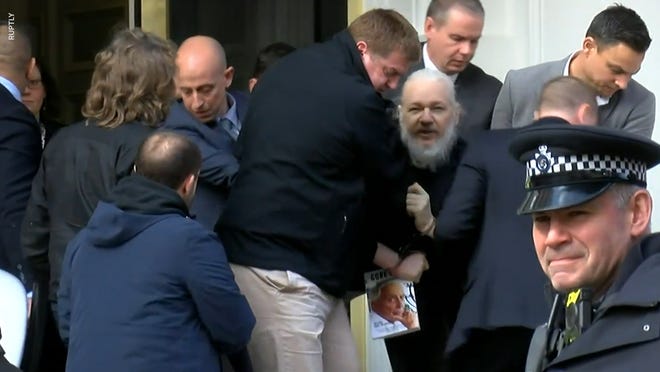
Still, it's far from certain that Assange will lose his extradition case. And even if he does, it does not automatically follow he will be sent to the U.S., according to Anand Doobay, an expert in the rules governing extradition at London-based firm Boutique Law.
Doobay said if the judge decides "not to refuse" the U.S. request then Britain's secretary of state will have to decide whether to order it, a call that involves scrutiny of factors such as whether there is a risk that by extraditing him Assange could face the death penalty. British law forbids extradition under such circumstances.
While none of the current charges carry the death penalty, Assange's supporters have argued that the Trump administration can't be trusted and could decide to unveil additional charges that do carry a death sentence once Assange arrives on U.S. soil.
'Angst, anger':Roger Stone intervention stokes uncertainty across justice system
Doobay noted that most extradition requests the U.S. makes to the U.K. are granted. It's not clear what will happen if Assange prevails in the British court. Because he has already served the 50 weeks for skipping bail he could simply be free to go. But if he is deported to his native Australia, the U.S. could try to mount a new extradition case. It could also issue an international arrest warrant if he travels beyond Britain's borders.
Assange's health will also be considered and Nils Melzer, the United Nations' special rapporteur on torture, said in an interview that when he visited Assange in Belmarsh Prison in May last year he was displaying symptoms akin to "psychological torture" likely caused by prolonged exposure to extreme stress, chronic anxiety and isolation.
"He was very agitated," he said. "Not the normal stress you would see in a prisoner."
In a series of preliminary hearings Assange has attended in person and by video link from prison he has sometimes appeared frail and confused when questioned by the judge. He has also lost weight. However, appearing in court for the extradition hearing in late February he mostly looked relaxed and appeared able to follow along with the proceedings. Although he complained several times that he was struggling to hear the legal arguments being made by both sides because of being forced to sit behind a high glass barrier in the courtroom, a scenario he said that has also prevented him from giving "confidential instructions" to his lawyers.
"I'm as much a participant in the court as a spectator at Wimbledon," he told the court at one point, referring to the British tennis tournament. "This case already has enough spying on my lawyers as it is," he added, an apparent reference to his claims that he was surveilled during his time in Ecuador's embassy.
Assange's legal team asked the judge, Vanessa Baraitser, to consider whether he can sit in the well of court, next to them, when evidence in the case is heard in May.
She said she saw no reason to change the seating arrangement.
'Permit Mr. Assange to sit with us ... Not overheard'
— Kim Hjelmgaard (@khjelmgaard) February 27, 2020
WikiLeaks' Hrafnsson said Assange's health has been improving but his father, John Shipton, told reporters ahead of the hearing that his son's long confinement has damaged his health and he feared any U.S. extradition would be akin to a "death sentence."
"His situation is dire, he has had nine years of ceaseless psychological torture where false accusations are constantly being made," said Shipton.
Recently, more than 60 doctors wrote an open letter to Britain's secretary of state saying they fear Assange's health is so bad he could die inside Belmarsh Prison, while 130 prominent figures from the worlds of art, politics and the media in Germany urged authorities to release Assange from detention because of his "critical health."
"If the law is respected, then I don't see any way for him to be lawfully extradited to the U.S.," said Melzer, the U.N.'s envoy on torture, noting that there is a "political offenses exclusion" in Britain's extradition treaty with the U.S. and that "espionage really is the quintessential political offense."
Melzer added that while governments often prosecute leakers and whistleblowers, government employees who actually implement official policy that involves the perpetration of crimes, such as systematic torture, generally enjoy complete impunity.
Instead, he said, with Assange, "we're sanctioning" those that disclose this information.
"That can't be right," he added.
At the hearing, the prosecution has argued that Assange should not be able to rely on the "political offenses" exemption in Britain's extradition treaty with the U.S. partly because in publishing the information he did Assange was not expressly trying to overthrow or a cause a change in the U.S. government or its foreign policy.
Fitzgerald, for the defense, described this argument as "absurd."
"What other reason would Mr. Assange have for publishing this information if it wasn't to cause a change in U.S. policy" in Iraq, Afghanistan and elsewhere, he said.
Steve Bannon testifies:Trump saw Roger Stone as 'access point' to WikiLeaks
Melzer, who is an academic and a lawyer, also expressed concern over the allegations of rape and sexual assault made against Assange that date from 2010. Sweden's authorities ended their investigations without charging Assange in November due to what they characterized as weakened evidence. Melzer said the police reports are riddled with contradictions and possibly even exculpatory evidence, such as text messages that indicate one of the claimants didn't want to accuse Assange of anything and that it was the police who "made up the charges." This claimant was only concerned about getting Assange to take an HIV test because they had unprotected sex.
Melzer said he has written multiple letters to the Swedish authorities asking for clarifications over inconsistencies in internal police correspondence but the response from the Swedish government has been: "We have no further observations."
In one letter Melzer wrote to Sweden's minister of foreign affairs in May last year he says Assange has effectively been "publicly shamed" and "defamed."
The Swedish Prosecution Authority said in a statement to USA TODAY that its case against Assange is closed and it does not want to comment on Melzer's allegations.
The Swedish allegations may appear tangential to Assange's case, but they are in fact a central plank in the circumstances that have directly led to his current plight: It's unlikely Assange would have fled to the embassy without Sweden's original claims.
Geoffrey Robertson, a human rights lawyer who previously represented Assange – Robinson, from Assange's defense team, works in the firm he founded, Doughty Street Chambers – said that there was "no doubt" that the Trump administration was prepared to pursue Assange "to the ends of the Earth" because it is "determined to create precedents that will shackle investigative journalism" and prevent it from airing the U.S.'s secrets.
"This is about deterrence," he said.
Still, Robertson added that "America is a beacon of free speech" and the First Amendment is a "phenomenal example to the world" at a time when all over the planet autocratic governments are trying to jail journalists or "shut them up."
It would be a shame, he said, if the U.S. "abandons its principles when we need them."
Robertson, who like Assange was born in Australia, has won landmark rulings on civil liberties from the highest courts in Britain, Europe and elsewhere. He has been a United Nations war crimes judge and defended scores of people facing death sentences.
"What the U.S. wants to do with Julian Assange – let him die in jail, essentially – is completely disproportionate to what he has done: told the truth. And no one has disputed that what Julian Assange did was anything but tell the truth," he said.